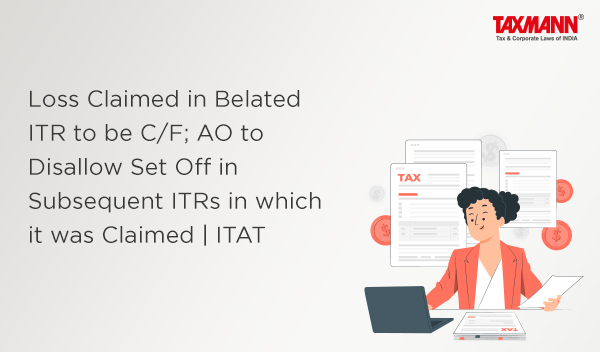Loss Claimed in Belated ITR to be C/F; AO to Disallow Set Off in Subsequent ITRs in which it was Claimed | ITAT
- Blog|News|Income Tax|
- 3 Min Read
- By Taxmann
- |
- Last Updated on 8 December, 2023

Case Details: International Fresh Farms Products India Ltd vs. ITO - [2023] 157 taxmann.com 127 (Chandigarh - Trib.)
Judiciary and Counsel Details
- Aakash Deep Jain, Vice-President & Vikram Singh Yadav, Accountant Member
- Parikshit Aggarwal, CA for the Appellant
- Rohit Sharma for the Respondent
Facts of the Case
The assessee filed its return of income declaring total income at NIL and claiming to carry forward the current year’s business losses claimed under section 35AD. The return was filed after the expiry of the due date of furnishing of the original return. While processing the return of income under section 143(1), the Assessing Officer (AO) denied business losses to be carried forward as the return was filed belatedly.
Assessee contended that the language provided in section 80 was “carry forward and set off”. Therefore, these phrases must be co-jointly read and cannot be segregated. It is only in the year in which the assessee claims the set-off that the provisions of Section 80 may be invoked by the AO in the subsequent assessment year.
The matter reached before the Chandigarh Tribunal.
ITAT Held
The Tribunal held that Section 73A(2) provides that any loss computed with respect to any specified business referred to in section 35AD that has not been wholly set off shall be carried forward to the following assessment year. It shall be set off against the profits and gains of any specified business carried on by him assessable for that assessment year. The right of the assessee to carry forward and set off losses has been made subject to provisions of Section 80 of the Act.
Section 80 provides that no loss which has not been determined in pursuance of a return filed as per section 139(3) shall be carried forward and set off under section 73A(2). Section 139(3) provides that where a person has incurred a loss in any previous year under the head “profits and gains of business or profession” and claims that such loss should be carried forward in terms of section 73A(2), he may furnish the return of income within the time prescribed u/s 139(1) of the Act.
In the instant case, there were two aspects of the matter. Firstly, the determination of loss of the specified business by the AO and the carry forward of the said losses to the subsequent assessment year. The AO for the impugned assessment year has to determine the loss from the specified business and notify the same assessee of accepting the loss as claimed by the assessee or suggesting any variation thereof.
For the carry forward of loss, the Tribunal held that there was no legal and justifiable basis for the AO/CPC to deny the assessee the carry forward of current year business loss of specified business for being set off against eligible profits in the subsequent years. It is for the AO examining the return of income for the subsequent year where the assessee seeks set off of the brought forward losses to take into consideration whether the return of income for the year of incurrence of losses of the specified business has been filed within prescribed due date or not and then, take appropriate action as per law.
Therefore, the Tribunal set aside the original order and directed the AO/CPC to allow the carry forward of losses.
Disclaimer: The content/information published on the website is only for general information of the user and shall not be construed as legal advice. While the Taxmann has exercised reasonable efforts to ensure the veracity of information/content published, Taxmann shall be under no liability in any manner whatsoever for incorrect information, if any.

Taxmann Publications has a dedicated in-house Research & Editorial Team. This team consists of a team of Chartered Accountants, Company Secretaries, and Lawyers. This team works under the guidance and supervision of editor-in-chief Mr Rakesh Bhargava.
The Research and Editorial Team is responsible for developing reliable and accurate content for the readers. The team follows the six-sigma approach to achieve the benchmark of zero error in its publications and research platforms. The team ensures that the following publication guidelines are thoroughly followed while developing the content:
- The statutory material is obtained only from the authorized and reliable sources
- All the latest developments in the judicial and legislative fields are covered
- Prepare the analytical write-ups on current, controversial, and important issues to help the readers to understand the concept and its implications
- Every content published by Taxmann is complete, accurate and lucid
- All evidence-based statements are supported with proper reference to Section, Circular No., Notification No. or citations
- The golden rules of grammar, style and consistency are thoroughly followed
- Font and size that’s easy to read and remain consistent across all imprint and digital publications are applied



 CA | CS | CMA
CA | CS | CMA
